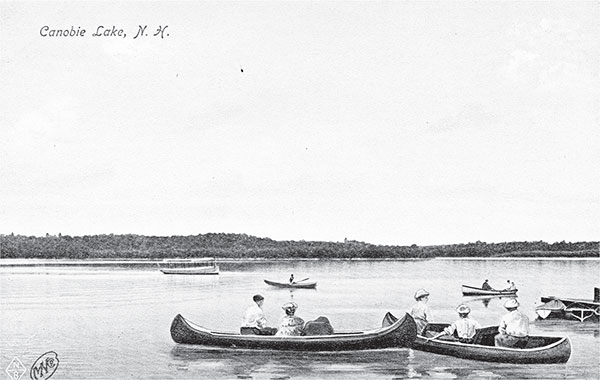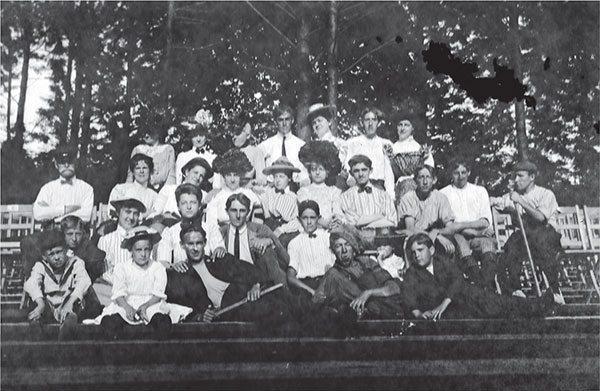
An early postcard showing Canobie Lake as seen by vacationers at Granite State Grove. Author’s collection .
14
A DAY AT GRANITE STATE GROVE
Before the heyday of the tourists traveling north to vacation at either Cobbett’s Pond or Canobie Lake, one man had the vision to see Canobie Lake, then known as Policy Pond, as the perfect summer getaway. In 1850, a man whose name has been lost to history purchased a large lot of land along the Windham shore of Policy Pond in order to build Policy Pond Grove. The new business offered picturesque picnic groves where family and friends could gather and spend an afternoon eating lunch, shaded from the sun by the surrounding trees. Those looking to cool off during the hot days of the summer could take a swim in Policy Pond. For those not looking to get wet, or simply wanting to take a scenic ride around the lake, boats were docked along the shore, ready to be rowed for hours at a time.
Policy Pond Grove proved to be a great success, drawing large enough crowds to justify major improvements to the property in 1857. As some vacationers would not want to be bothered bringing a picnic lunch up from Massachusetts—or wherever they may have been traveling from—a small kitchen was opened to sell fresh meals to eager customers. Also, sailboats were added, giving those wanting to relax an alternative to rowing. When the improvements were completed, more and more people visited, increasing revenue more than ever. After the end of the Civil War, the business was successful enough to attract prospective buyers, and the operation was sold to William H. Smith in 1867.
Smith was even more ambitious with the business than the previous proprietor, adding the first bowling alley in Windham to the grove. He also built a large house and stables on the property. With more vacationers desiring to take a leisurely boat ride around Policy Pond, he also increased the number of boats for rent from twelve to fifteen. Smith had the business acumen and foresight to build Policy Pond Grove into a recreational destination that was unmatched by any similar venue in the area. With the business continually growing and providing Smith with a substantial income, Policy Pond Grove proved to be very attractive to Abel Dow. In 1877, Dow purchased the business.
Dow’s purchase was at an opportune time, just before railways and street railways expanded to bring more vacationers to the area, stopping near Policy Pond. Shortly after purchasing the business, Dow renamed it to Dow’s Grove, which later on seemed to be a wise choice, considering the name of the lake was soon after changed to Canobie Lake. However, the name Dow’s Grove did not last long, as it was changed by Dow in 1896 to Granite State Grove.
As the lake became more and more accessible by the turn of the twentieth century, the recreational activities on the property had to be expanded, including the bowling alleys. Dow had also constructed a shooting gallery, where young men looking to impress a young lady or gain some bragging rights would take aim at the target with a small-caliber rifle. A roller skating rink was also constructed, which quickly became one of the most popular attractions at the grove. Finally, you could end your day at the dance hall, where the young and old could dance to live music from bands and individual singers.
Before the grove began to face competition from the opening of Canobie Lake Park on the opposing shore, the property also became a popular spot for outings. In 1901, the Court Nutfield chapter of the Foresters of America held their annual field day and picnic at Granite State Grove. Almost two hundred people were in attendance, mostly arriving by train, with a special train stopping at the grove just for the outing. Many of the guests were sure to take full advantage of the amusements at hand, patronizing all the recreational activities Dow had to offer. However, the big event of the day was a baseball game between the Salem Centers and the Derry Stars.
At 3:00 p.m. that day, the two rival teams faced off for the fourth time in that season. The Centers, having lost a game sixteen to zero the week before, were certainly hoping this game would be one of redemption for their team. Although the team might not have been highly regarded for its performance, there was one Salem player in particular who stood out that season. He was an old-timer named Wheeler who had a reputation for arguing every close call; he was often successful and was responsible for garnering many points for the Centers.

An early postcard showing Canobie Lake as seen by vacationers at Granite State Grove. Author’s collection .
Not having a regular baseball diamond to play on, the teams played rather close to the lake. However, there was one problem with this arrangement. Due to the baseball field’s proximity to the water, the baseball found its way to the lake early on in the game. The soaking-wet ball made pitching more difficult, resulting in lousy pitches that made the game hard for not only the pitchers but also those up at bat. Despite the complications of a wet ball, Derry’s pitcher, F. Sullivan, was able to strike out twelve batters, eleven of whom could not even make contact with the ball.
The performance of Salem’s pitcher, Smith, was relatively lackluster, he having struck out only four of the Derry batters. Although the Centers played much better than they had the previous week, they still could not pull off a win, with the game’s ending score being seven to four in favor of the Stars. The game had lasted for one hour and fifty-five minutes, much shorter than the average modern-day baseball game. This left the fans with ample time to enjoy the other activities offered at the grove.
One such activity was a game of tug of war, which took place between the Foresters and the Canado-Americaines. The Foresters were no match for their opponents, and the Canado-Americaines walked away victorious. Following this was a one-hundred-yard dash, which was won by an E. Smith, though there was no word on how long it took him to run the distance. For those looking for something a little less serious than the distance sprint, a sack race and a three-legged race were held. The winners of those races were C. Sling and the team of J. Gibeau and C. Sling, respectively. As no track and field event would be complete without some form of a long jump, one was held, and W. Clark took first prize.

A group of summer vacationers on Canobie Lake, circa 1905. Author’s collection.
With an open lake to use, it would only make sense that there would also be competitive events taking place on the water. The first of these was a boat race, which was won by David DeVarney. There was also a swimming contest that was won by H. Low. Prizes were awarded to the winners, but there is no record of what the prizes were. After a long, hot summer day, a day spent at the lake was likely a prize itself; it is doubtful any of the contestants truly cared about the prizes awarded that day.
It was fortunate the outdoor activities took place earlier in the day when the weather could not have been better, as it began to downpour soon after the day’s games concluded. This drove the crowds to the indoor amusements, especially the skating rink and the dance hall. The music at the dance hall for the night was provided by Madden’s orchestra from Derry. The group owed its name to J.W. Madden of Manchester, who was the promoter. When the special train arrived at Granite State Grove to bring the crowd back to Derry at 11:30 p.m., everyone departed knowing a summer day could have been spent in no better way.
However, there would not be many more summer days spent leisurely at the grove. For the next several years, Granite State Grove had a series of setbacks that eventually forced it to close indefinitely. First, with the opening of Canobie Lake Park nearby in 1903, the original attraction on the lake began to lose customers. Also, in 1903, swimming in Canobie Lake was banned, leaving the grove without one of its most popular recreational activities. Finally, on July 21, 1909, came the most devastating setback yet for the business. On that day, a fire began around noon in the skating rink. The fire spread quickly throughout the other buildings on the property and many of the trees in the grove also burned. Although the fire was eventually put out, there was an estimated $15,000 of damages. Unfortunately for Dow, he was unable to collect any insurance money on the property, and Granite State Grove never reopened.